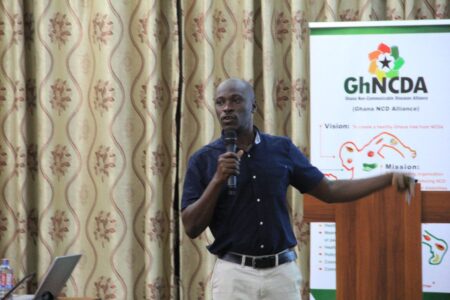The Ghana Non-Communicable Diseases Alliance (GhNCDA) has held a validation meeting to discuss the findings of a study assessing the economic burden of living with Non-Communicable Diseases (NCDs) in Ghana. The study, which highlights significant health challenges posed by NCDs, aims to gather stakeholder feedback for validation.
The research focuses on the financial strain faced by individuals living with NCDs, particularly concerning health financing through the National Health Insurance Scheme (NHIS) and out-of-pocket expenses incurred by patients and their families. Despite the NHIS, NCDs account for approximately 43% of deaths in Ghana, underscoring the urgent need to address the financial implications of these diseases.
Lead Researcher – Dr. Leonard Baatiema, presented the study’s findings and recommendations, noting that the NHIS has struggled to cover essential NCD services. This shortfall has led to significant out-of-pocket healthcare expenses for patients, primarily due to the government’s decision to cap the fund at 25% in 2018. Dr. Baatiema highlighted that out-of-pocket costs for NCD treatments reached up to 38%, placing a considerable financial burden on those seeking care. The study, which used purposive sampling to gather information from people living with NCDs in parts of the Eastern and Greater Accra Regions, revealed that 68% of people living with diabetes pay for their healthcare out of pocket.
The research recommends that the government address delays at various care points by employing more health professionals and expanding existing facilities. It also calls for intensified health education among the citizenry.
National Coordinator of the Ghana NCD Alliance, Labram Masawudu Musah commended alliance members and government agencies for their contributions to the study’s findings and recommendations. He assured attendees that the dissemination of the findings and recommendations would take place by mid-August, with copies presented to relevant stakeholders for action.
“We hope to see you at the dissemination meeting where the findings will be shared with all of you and other stakeholders for action,” Musah concluded.
The validation meeting marks a significant step towards addressing the economic burden of NCDs in Ghana and improving the financial sustainability of healthcare for affected individuals.
By Derick Botsyoe || ghananewsonline.com.gh

